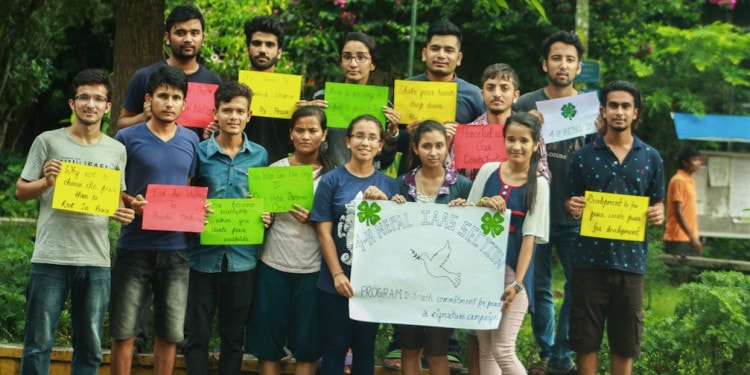Agriculture is the backbone of Nepali economy, employing over 66% of the country’s labor force and providing over one-third of the country’s gross domestic products. Most importantly, agriculture makes the livelihood of most Nepalian citizens, as it brings in 83% of the country’s household earnings. In this context, evidently, agriculture is very important for Nepal’s national economy. Nevertheless, many farmers are marginal or small holders (over 52%), having less than 2 hectares of land, which is not always farmland. As a result, more than 60% of farming households do not even produce enough grain for their personal household.
In recent years, massive interventions have been made through targeting youth, women and other marginalized groups of people. Different national and internal organizations are providing different forms of support to these groups, but, unfortunately, the outcome has not provided the prosperous results expected.
So, the time has come to consider the issue critically, and revise policies, guidelines, working strategies and approaches wherever necessary. Therefore, new intensive workshops are being held to identify the major issues in Nepali agriculture, such as empowering young women in the agriculture sector. In addition, Nepal has been using rigid and archaic techniques in agriculture considerably longer than nations on other continents.
This has drastically decreased agricultural production throughout the years, and has predominantly contributed to Nepal’s hunger problem, malnutrition and underfed population. In spite of massive inputs and interventions, the results are incredibly slow in pace; also, those involved in agricultural entrepreneurships have failed to make significant changes in their life, due to the decreasing involvement of innovative thinkers. Unfortunately, there might be several reasons behind this.
 In The Photo: 4-H Session. Photo Credit: 4-H Nepal.
In The Photo: 4-H Session. Photo Credit: 4-H Nepal.
Motto of Symposium: An Engaging Conference
To conquer the problems posed in recent years, 4-H proposed a Symposium. The symposium aims at addressing these problems by combining key agricultural leaders together with small rural farmers, from different parts of Nepal. This aims to create a positive strategy which will collaborate new technology, exchange of experience with access to funding.
This symposium could be the best platform for those who are already engaged in agriculture entrepreneurship, and those who are interested to initiate their participation in entrepreneurship, to learn, exchange and convey new skills while communicating with each other. Importantly, this could also motivate youths and women to engage in the agricultural sector.
It helps to start agribusiness for new and existing entrepreneurs, and provides a complete package of learning and motivation for these entrepreneurs. Therefore, through providing Nepalese youths, including perspective women entrepreneurs, important knowledge on Nepal’s agricultural policy program, their queries of agriculture are answered by experts in the field.
Not only will their intellect of critical agricultural information improve, but they will be supported through required technical knowledge which will enhance their eagerness and readiness for agricultural entrepreneurship; this allows them to share their experience and learning with fellow entrepreneurs, and make other men and women ready for the job. These are the primary goals of the conference.
 In The Photo: Best Farmer Award at the 2nd Symposium. Photo Credit: 4-H Nepal.
In The Photo: Best Farmer Award at the 2nd Symposium. Photo Credit: 4-H Nepal.
Overview and Objectives of the Symposium
4- H Nepal organized two national agro entrepreneurship Symposium’s in 2016 and 2018, for the first time in Nepal. More than 400 young farmers and entrepreneurs attended, and 1000 were engaged with the organisation’s efforts: 165 volunteers, 56 experts, 32 VIP and 7 motivators contributed, and 84 national organizations, 24 government agencies collaborated with 4-H Nepal during the period of the two years.
The objective of the conference was to bring youth entrepreneurs and policy-makers together in a platform to discuss issues and challenges of youth participation in agriculture, and enable the movement of the youth agro-entrepreneurial environment in Nepal.
The First Argo Entrepreneurship Symposium, 2016
4-H Nepal organized a two day conference from the 4th-5th July, 2016, in Kathmandu. The inauguration ceremony was chaired by Mr. Lok Raj Awasthi, Chairperson of 4-H, Nepal, and the Chief Guest was Honorable Vice President, Mr. Nanda Bahadur Pun. The Special Guests in attendance were Honorable Minister of Agriculture Mr. Hari Bol Gajurel, and His Excellency Yaron Mayer, Ambassador of Israel to Nepal.
Youth entrepreneurs, agriculture enthusiasts, experts from various sectors, representatives from government authorities, civil society organizations and farmers’ organizations all came together to share their experiences and skills among the participants in the conference; during the first symposium, these guests formed a loose network entitled ‘Youth Agro Entrepreneurs’ Association’. The members of this network have been engaged in advocating and facilitating the issues of agriculture, entrepreneurship and access to youth entrepreneurship’s in various districts.
 In The Photo: Chief Guest, Honorable Vice President of Nepal at the 1st Agro Conference, 2016. Photo Credit: 4-H Nepal.
In The Photo: Chief Guest, Honorable Vice President of Nepal at the 1st Agro Conference, 2016. Photo Credit: 4-H Nepal.
Major Highlights of the First Conference
- The conference was the first of its kind to bring youth farmers together with key agricultural figures to discuss, share and learn of the problems and issues related to agro based entrepreneurship.
- Farmers, from different areas of Nepal, experienced an excellent opportunity to share their struggles, problems, experiences, successes and lessons in the conference.
- Documentary television shows, which were produced suited to different themes of agriculture, were screened in the conference. Most of the documentaries centered on the successes and learning of farmers, and their farming initiatives.
- Plenary discussions on various thematic and practical areas of the agriculture sector were conducted. There was innumerous interaction among participants, presenters and panelists.
- Working papers on different themes of agriculture were presented by scholars, experts of agriculture, and experts of the agro-entrepreneur sector.
- Most of the problems, issues and needs of the farmers, discussed in the conference, were summed up in the form of a declaration which was issued and recommended for the concerned stakeholders.
- The conference was able to identify the problematic issues in agriculture, and the need to develop the required skills of entrepreneurship among farmers and youths. The conference was also fruitful in identifying possible personnel interested in engaging with the agriculture sector.
- The conference proved to be a good platform to establish and initiate a network of famers and youths across Nepal. Using the social media platform Facebook, they formed a group of farmers interested in holding discussions on regular basis.
Major Achievements
- The first conference proved to be a good platform to raise the concerns of youths regarding their involvement in agriculture, and establishing their linkage to the agriculture sector.
- The motto of the first conference was ‘Youths in Agro-Entrepreneurship’, and most of the speakers and presenters stressed the need to give special emphasis on youths in agro-entrepreneurship. The Ministry of Agriculture was consequently influenced to incorporate the phrase ‘Youths in Agro-Entrepreneurship‘ in its 30-point agenda for the development of the agriculture sector in Nepal.
- The agricultural, academic campuses of Nepal expressed their commitments to send students studying agriculture science as participants in the upcoming conference.
- The NGOs working in the youth and agriculture sector started incorporating ‘entrepreneurship in agriculture’ as one of their thematic areas, and also started promoting the concept.
- The participants of the first conference formed a loose network of 4-H Institute of Agriculture and Animal Science (IAAS), Lamjung section. The network was involved in the observation of the local, provincial and federal elections held in 2017. The network has been proactively contributing to areas of agriculture through volunteering, and providing benevolent services in different parts of the country.
 In The Photo: Launching Future Farmer Program at the 2nd Symposium. Photo Credit: 4-H Nepal.
In The Photo: Launching Future Farmer Program at the 2nd Symposium. Photo Credit: 4-H Nepal.
Second Youth Agro Entrepreneurship Symposium 2018
4-H Nepal, in collaboration with its partners, organized the Second Youth Agro Entrepreneurship Symposium at Nepal Tourism Board, Bhrikutimandap, Kathmandu on the 20th-21st May, 2018; this symposium held the slogan- Educate, Advocate and Communicate: Empowering Youth in Agriculture. Youth entrepreneurs, agriculture enthusiasts and experts from various fields shared their experiences, learning and skills in the conference. Youths from various parts of Nepal joined in Kathmandu to share their experiences, innovations and visions. They discussed agriculture and the youth entrepreneurship policy in regards to the environment in Nepal.
The symposium helped to establish the network, and develop platforms and mechanisms for youth entrepreneurship through collective and collaborative endeavors. Such effort would help to create an enabling environment for youths to engage in agriculture. Some 170 participants participated in the two-day symposium.
Promotional Activities of Nepal Agriculture
- Agro-entrepreneurs and business firms from different parts of the country held stalls of food products, such as honey and pickles in the conference
- NABIC, Everest Bank and Nepal Mediciti Hospital held stalls to promote their services, and also to market among participants of the conference.
- Medi-City hospital provided mobile health camps, which included free blood sugar check-ups, blood pressure check-ups and first aid services, to more than 300 persons in conference.
- Agriculture related arts, painting, sketches and dramas were displayed and performed to encourage the participators to actively involve themselves in a scientific and innovative way.
- Promotional stickers with the UN’s 17 Sustainable Development Goals (SDGs) were distributed to the participants, presenters and volunteers in the conference. Similarly, T-shirts with the logo of the second conference were distributed to volunteers and participants for visibility, publicity and promotion in the conference.
- More than 50 volunteers had been mobilized to ensure great management and smooth functioning of the conference.
 In The Photo: Students planting Rice. Photo Credit: 4-H Nepal.
In The Photo: Students planting Rice. Photo Credit: 4-H Nepal.
Future Farmer: Smart Farmer: A Campaign
Future Farmer: Smart Farmer, a national campaign aiming to increase the participation and attraction of agriculture to youths, was launched in the symposium.
The campaign intended to attract youths already involved in the agriculture sector. Through this campaign, capacity, skills and the knowledge held by youths regarding the agricultural sector will be enhanced further. This campaign aims to transform them into capable and well-informed farmers, and aspires to consequently convert them into agriculture enterprises.
Such transformative training will, ultimately, enable these individuals to contribute to the nation’s future as successful farmers. Therefore, under this campaign, application of information, communication, technology and innovative approaches will be promoted and highlighted in agriculture sector.
The campaign will be entirely environment-friendly and will follow a holistic approach to promote eco-biological, Vedic and organic farming among youth agriculture farmers.
Youth Volunteers with Farmers: A Campaign
Another campaign, entitled “Youth Volunteers with Farmers”, was also made public in the conference. A national network of students studying agriculture science, in different colleges of Nepal, was formed to create the moving campaign.
Kathmandu Declaration
The conference endorsed a 15 point Kathmandu Declaration; the declaration’s points were developed as per the issues raised, discussed and presented in the conference. The conference unanimously endorsed the declaration and urged the concerned authority to address the issues raised. The declaration called for the modernization of the agriculture system, local level-oriented allocation of budget in agriculture, one modern agro center in each local unit and demanded the provision of relief to the quake-stricken farmers.
The declaration paper had various demands: providing social security to farmers, customs waiver for imported agro products, legal action against farmers using poisonous chemicals and incorporation of agriculture related educational curriculum in the school, among others.
 In The Photo: 4-H in Agriculture. Photo Credit: 4-H Nepal.
In The Photo: 4-H in Agriculture. Photo Credit: 4-H Nepal.
Output of Symposium 2018
Evidently, the conferences held in the form of the Symposium’s were incredibly mobilisng and eye-opening in regard to the need for improved conditions and knowledge for youth farmers and agricultural entrepreneurs. Symposium not only endorsed the critical Declaration, but also had some fantastic results:
- Most of the conference’s youth participants realized agriculture is the main base for Nepali economy, however, due to its neglection it has become less attractive. It is also due to lack of proper policy and incentive from the government – and this is something which nees to be transformed and overcome.
- Networks of farming youths were established from different areas of the country, they use the forum to share innovative ideas and learning in regards to agriculture and agro-entrepreneurship.
- Government agencies expressed their commitments to ensure good investment is placed in agriculture, and prevent the flow of youths to foreign countries.
- Parliament member of Province no 2 who attended the conference raised the concern in the parliament of Province no 2 that the government should prioritize agriculture as the main area of investment and ensure the engagement of youths in agriculture.
- Youths become aware of the importance of Vedic farming and realized the need for accommodating such farming – the modern technology in farming.
- Two campaigns – “Future Farmers: Smart Farmer” and “Youth Volunteers with Farmers” were launched to attract youths to agriculture, consequently it is expected they will gradually develop the skills for agro-entrepreneurship.
— —
4-H Nepal
4-H Nepal is a non-profit, non-government and youth-led organization. The four ‘H’’s stands for Head, Heart, Hands and Health. It is a global movement or campaign which advocates for restoration and promotion of agriculture. Globally, 4-H is formally registered in respective countries and is actively engaging its youth into agriculture related activities in 52 countries. 4-H Nepal is the first organization of this kind in South Asia, which works for promotion of agricultural entrepreneurship through the engagement of youths in Nepal.















